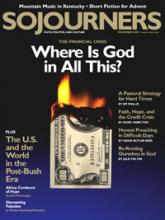For Catholics and mainline Protestants, the weekly Sunday texts are assigned through a lectionary, with readings arranged in a three-year cycle. Thus, on any given Sunday, millions of Christians hear the same passages of scripture in their congregations. Although some Christians find this a constricting spiritual practice, I am often surprised at how relevant the texts can be—even in a moment of crisis.
In September, a few days after Treasury Secretary Henry Paulson first started crafting a bailout for the spiraling Wall Street crisis, the assigned texts were Exodus 16:2-15 (God giving manna in the wilderness to Israel) and Matthew 20:1-16 (the parable of the generous landowner). As they were read from the pulpit, I literally gasped as the stories told of a God who provides for God’s people in the most trying of circumstances, giving food enough for the day.
As I glanced around the suburban parish, I saw plenty of worry on people’s faces. On the surface, these were comfortable churchgoers. But, after the last several months of economic battering, I knew that there was anxiety enough to go around. Soaring gas prices have cut into our paychecks, falling home prices cause us concern about equity nest eggs to pay college tuition bills, and never-ceasing cutbacks in insurance coverage are surely at the basis of our prayers for good health.
Now the stock market collapse threatens whatever money these nice Episcopalians have saved for retirement. I know how easy it can be to poke fun at suburbanites. But these are the people whom my grandmother always called “good Christian folks,” those who have played by the rules and lived with integrity. Now they are watching their security and future disappear. I leaned over to my husband and said, “I am really glad I’m not preaching today.”
Read the Full Article

